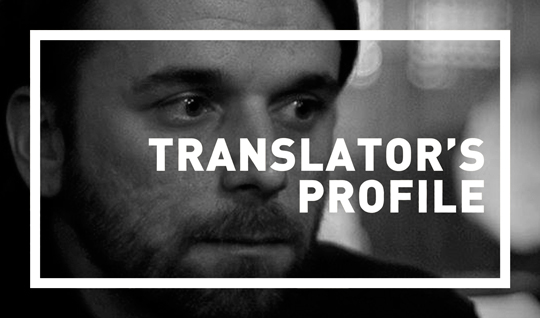Mirza Purić (b. 1979) is a translator and musician. A graduate of the University of Vienna, he has been an Editor-at-Large with Asymptote since 2014.
***
Who are you and what do you translate?
Out of necessity, I’ll translate whatever will bring home the bacon, but what I am is a literary translator. When I set out years ago I worked on fiction almost exclusively. These days I mostly do poetry, I don’t know how that happened. I also play obnoxious music on a bastard instrument which is neither a bass nor a guitar. I’m not sure if this answers the first question.
Describe your current/most recent project. Why is it cool? What should we know about it?
I’m working on a selection of poems by Yusef Komunyakaa, who is one of my favourite poets. There’s this sad cliché that says you can’t write about music just like you can’t dance about sculpture, or something to that effect. Whoever came up with that nugget of brilliance has obviously never read Komunyakaa. Apart from that, I try to make myself available to young, up-and-coming authors, people who swim against the tide and/or operate outside of the mainstream, so I’m always on stand-by for Sarajevo Writer’s Workshop, a group of promising young writers and poets founded by the American writer Stacy Mattingly (check out her essay on a project she led for the University of Iowa’s International Writing Program). As Asymptote’s editor-at-large I constantly snoop about for new talent. This country being what it is, a lot of gifted people don’t have a platform. Asymptote provides one, and I do what I can to help these people hop on it.
What author would you like to see more popular/translated in the first place?
The magnificent, incomparable Michael Köhlmeier. I translated a novella of his a few years ago and had the pleasure of doing a reading with him when it came out. He is criminally underrated internationally. Peter Carey needs to be available in every language that has a script. Julian Gough is hilarious, but there’s more to his writing than humour, and he ought to be published and read worldwide. Jack Shanik, the comedian, has got at least two brilliant manuscripts that someone should publish pronto. I could go on all day.
How did you know you would become a translator? How *did* you become a translator?
I never made a conscious decision to go into this business, in the sense that I never weighed it against anything else. I grew up with books and languages (and supportive parents – cheers, Mum and Dad!), and somehow it seemed a matter of course that I would end up doing this. I did work very hard to learn the ropes, though. University was immensely useful, although I didn’t actually study translation. I worked an awful lot at uni, publishing as much as I could, trying to hone my chops. Good times, those.
What’s your pet peeve about the translation/literary industry?
Literary-industry-as-such is one thing. Literary-industry-here-in-the-sticks is something I can’t even begin to explain. At any rate, I don’t have a lot of nice things to say. Working on books is great, of course, but the business side of things has never been very pleasant. I believe we need a new, radically different paradigm for literary publishing. We need one for most things, but especially for publishing. I’d like to think that the future belongs to CIC presses like And Other Stories.
What are you reading right now?
I’m reading Bojan Krivokapić‘s collection of short stories, the title of which translates as something along the lines of Run, Lilith, Demons Trip and Stumble, and Destrudo, an unpublished novel by Igor Banjac, a poet and novelist from Sarajevo. Good stuff. A friend has recently praised No One Belongs Here More than You by Miranda July, who I’ve never read before, so that’s next.
Where do you go for inspiration—translation, literary, or otherwise?
When I get stuck with a translation, I schedule a band practice. Conversely, when writing music isn’t going too well I hit the books. I’m immensely privileged to have two important creative pursuits in my life that feed off each other. I’m not a great believer in inspiration, though. Translation is a rational activity, there’s no voodoo to it, which is not to say that it’s not artistic. At any rate I find it infinitely easier to work when I’m at least halfway happy, so I try to do things which make me happy whenever I can.
If you weren’t a translator, what would you be?
I’d probably be a full-time musician and sound engineer, but I can’t really imagine not being a translator. I’ve cooked professionally before and I can see myself doing it again when I’m too old for the stage.
What advice do you have for aspiring translators?
I’m not entirely sure that I’ve earned the right to dispense professional advice at the tender age of 35, but here goes. First, read Venuti. Practise as much and as often as you can, that’s just common sense. Internalise your languages, live (in) them. If you can’t translate into, you probably shouldn’t translate from. Try to be accurate. When you can’t be accurate without writing something crass, take liberties. No matter who hired you, you work for the people in the story, and you answer to them. Don’t work for peanuts, ever. Do work pro bono if there’s no money to be made by anyone and you like the project. Always remember that human civilisation was built on what you’re trying to do—demand recognition. For trying, if nothing else.
What should every young translator be able to do?
Afford health insurance.
*****
Read more interviews:

